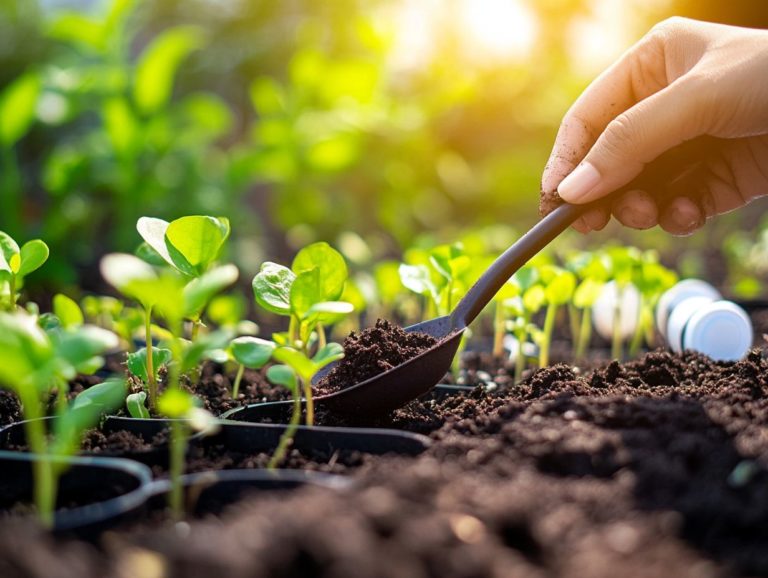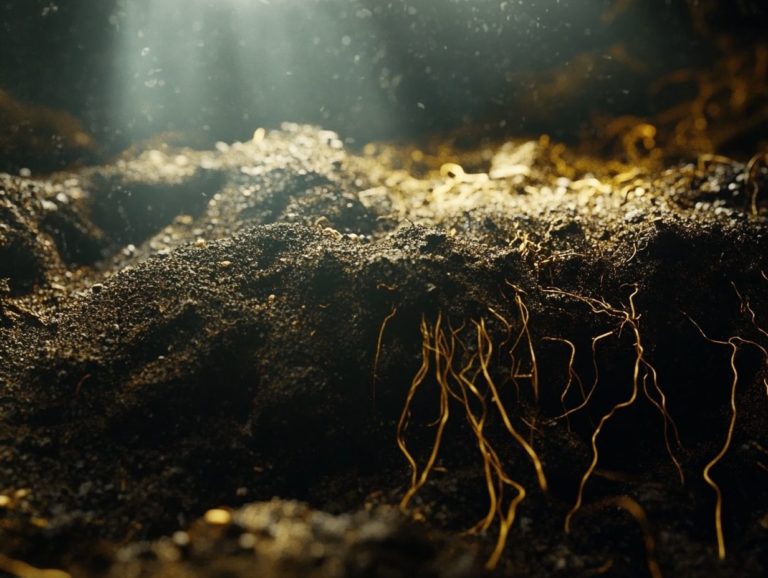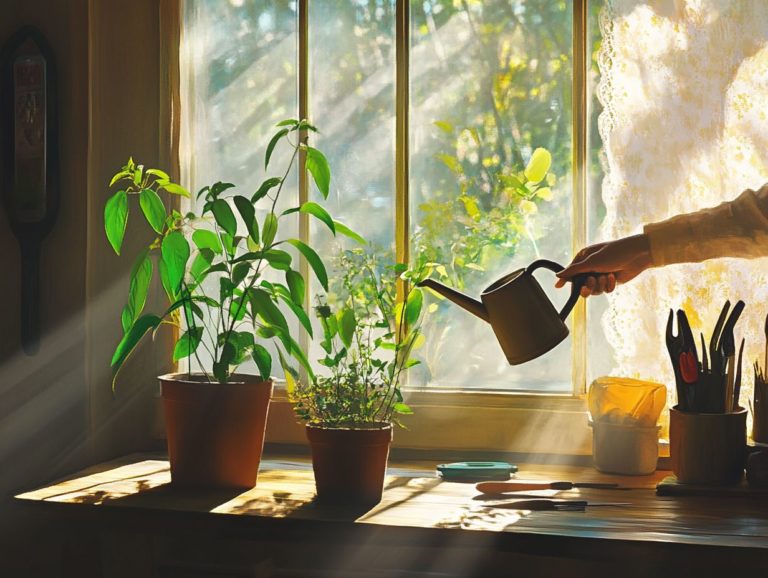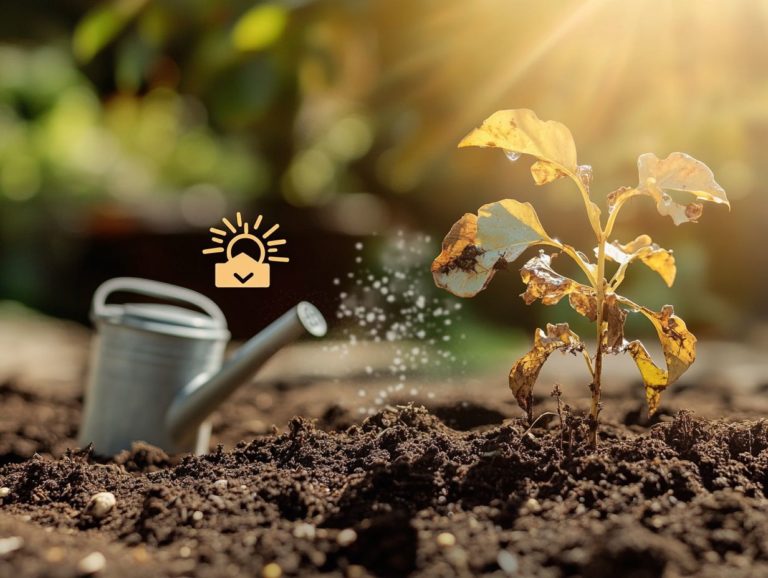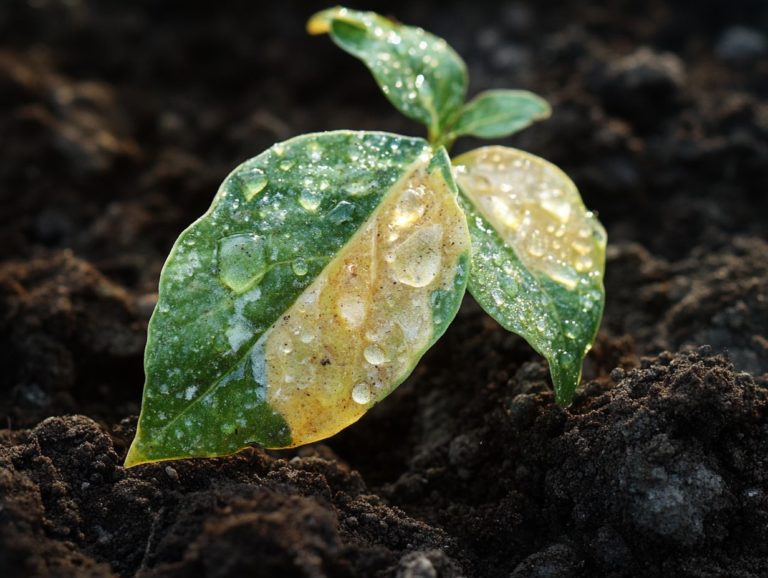How to Utilize Greywater in Gardens
Are you intrigued by the concept of greywater and its possibilities for enhancing your garden? Discover how greywater can transform your gardening experience!
This article explores greywater, setting it apart from blackwater, and showcasing its numerous advantages, such as promoting water conservation and saving money.
You will discover an array of greywater systems, along with expert guidance on how to design and install your very own. Plus, you ll find valuable tips for safe and effective usage.
You will also learn how to maintain your system and tackle common issues that may arise. Start transforming your gardening practices today for a sustainable future!
Contents
Key Takeaways:
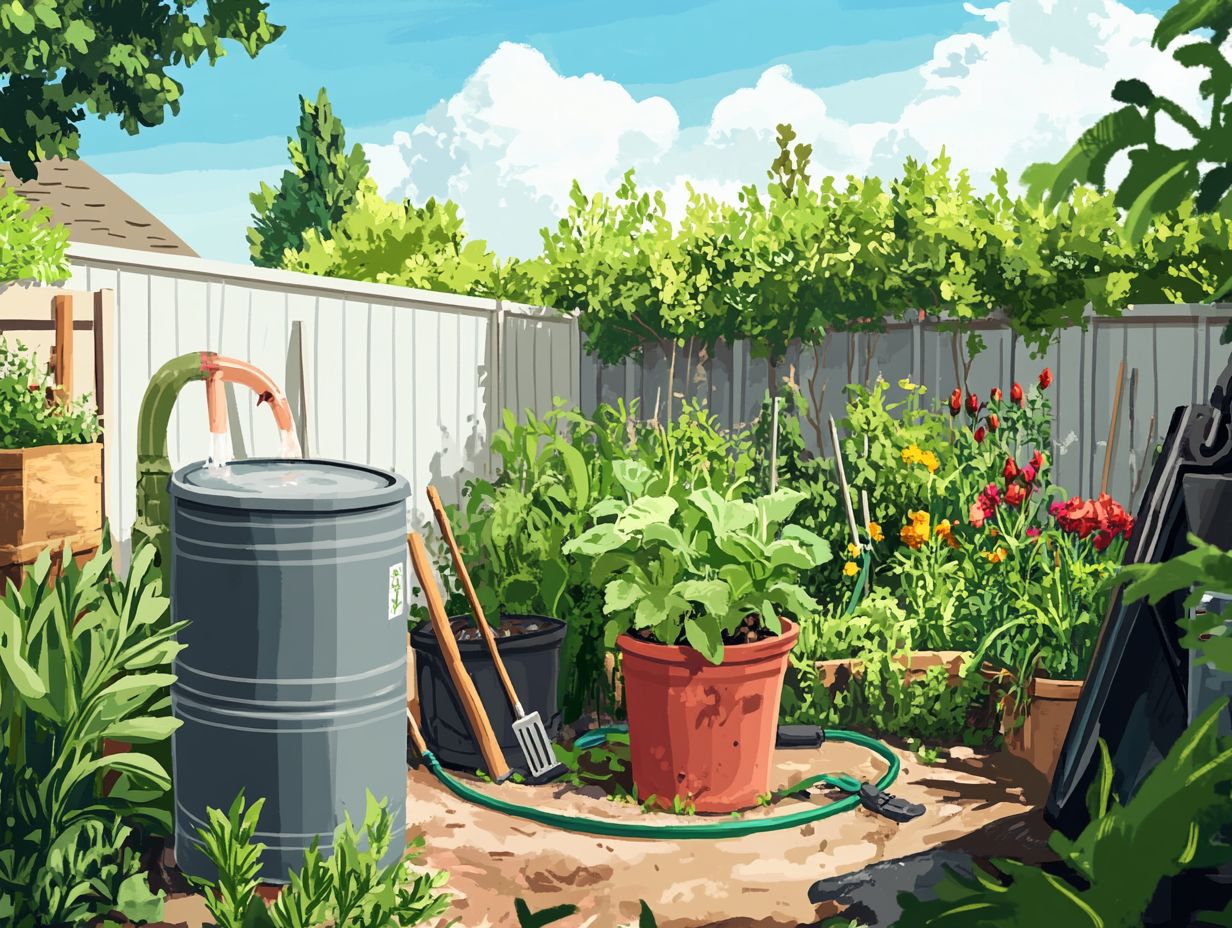
- Using greywater in gardens helps conserve water and save money on utility bills.
- Installing a greywater system requires careful planning and consideration of factors such as soil type and plant selection.
- To ensure safety and effectiveness, it is important to follow precautions and best practices when using greywater applications in gardens.
What is Greywater?
Understanding greywater is crucial for supporting sustainable water systems and enhancing environmental sustainability in urban areas. Greywater refers to the relatively clean wastewater produced from everyday household activities like bathing, washing dishes, and doing laundry.
Unlike blackwater, which is laden with sewage and heavily contaminated, greywater can be repurposed for a variety of uses, including garden irrigation. This makes it a vital component of effective water management, particularly during droughts and watering restrictions.
By adopting greywater reuse systems, you can significantly lower your water footprint while championing eco-friendly practices.
What is Greywater and How is it Different from Blackwater?
Greywater refers to the wastewater generated from household activities think sinks, showers, and laundry excluding any toilet waste. On the flip side, blackwater contains contaminated sewage, making the two distinctly different in terms of treatment and potential reuse.
Understanding the division between greywater and blackwater is crucial. It directly impacts how you approach disposal and recycling efforts. Greywater typically contains fewer pathogens, allowing for safer reuse applications, such as irrigation. In contrast, blackwater necessitates extensive treatment to tackle harmful bacteria and chemicals.
To make the most of greywater, you might consider implementing specific plumbing modifications, such as:
- Dual-piping systems allow separate pipes for greywater, making it easier to reuse water from sinks and showers.
- Water filtration units that enhance water quality.
These enhancements not only boost your water efficiency but also play a vital role in supporting sustainable practices and conserving those precious water resources.
Benefits of Using Greywater in Gardens
The advantages of incorporating greywater into your garden are numerous, primarily enhancing water conservation, supporting sustainable gardening, and promoting effective watering practices.
By using greywater for irrigation, you can save substantial amounts of household water, particularly during droughts or in areas with strict watering restrictions. Additionally, greywater offers vital nutrients for your plants, boosting their health and vitality while promoting sustainable gardening.
Using greywater not only cuts down on water waste but also strengthens our urban gardens. It s a simple step towards a more sustainable future!
Water Conservation and Cost Savings
Implementing greywater reuse systems in your garden champions water conservation and translates into significant savings on your household water bills! This is especially true in drought conditions.
By repurposing water from daily activities like showering or washing dishes, you can dramatically reduce your freshwater consumption. These systems allow you to collect water that would typically go down the drain and redirect it to nourish your plants.
For example, optimize drip irrigation systems with greywater. This ensures that water reaches the roots directly while minimizing evaporation. Using reclaimed water for non-edible plants can lead to considerable savings on water costs, often resulting in a noticeable decrease in your monthly utility bills.
Some regions offer rebates for installing these eco-friendly systems! This boosts your savings while helping the environment, enhancing both your financial and environmental bottom lines while supporting ecological landscaping.
Types of Greywater Systems
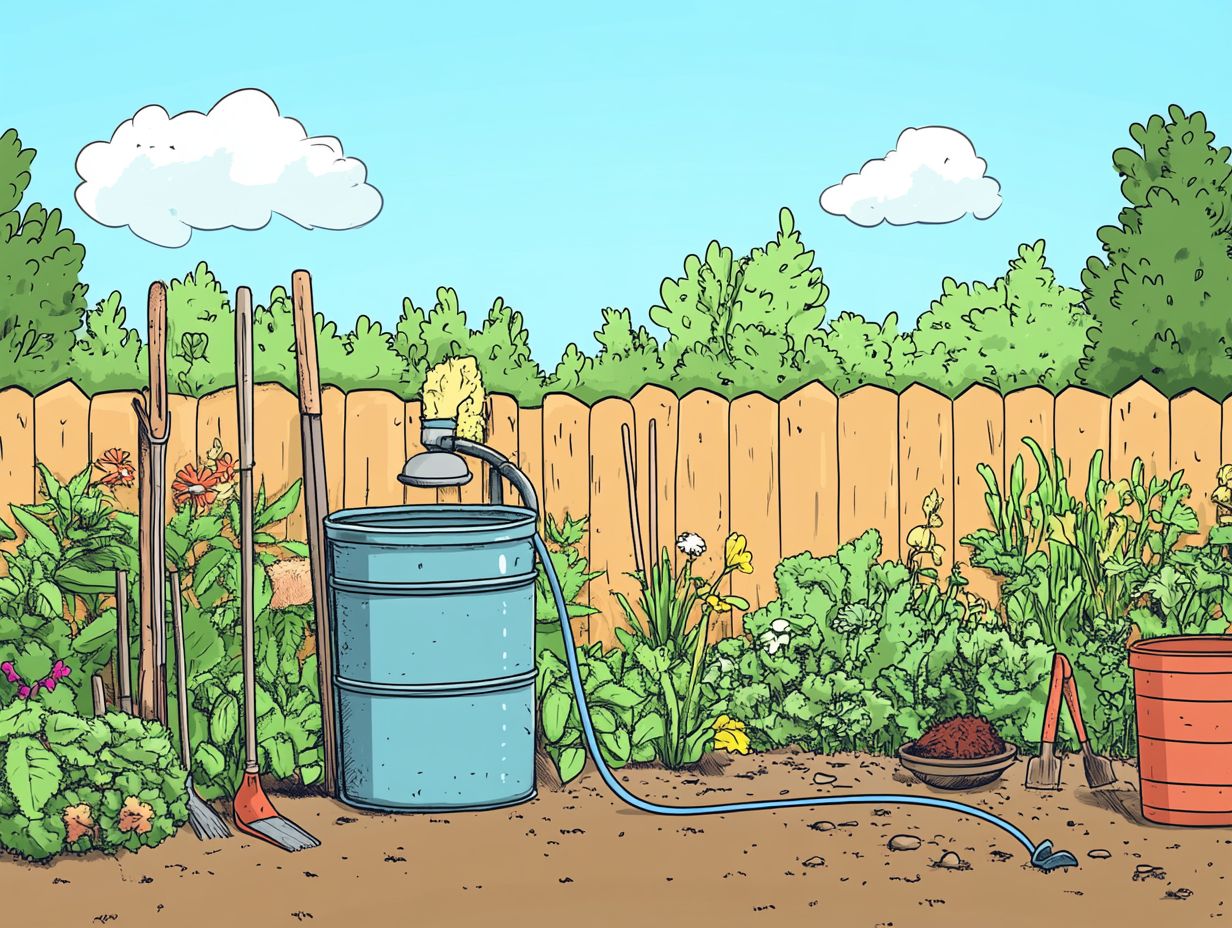
You ll find a range of greywater systems thoughtfully designed for efficient water reuse. Each taps into different sources of greywater, such as laundry and shower drains, as well as kitchen sinks for household water.
Overview of Different Systems
Different greywater systems can be classified by their complexity. They range from straightforward diverters to sophisticated filtration and treatment setups. Each type comes with distinct features designed to cater to various household needs.
If you’re looking for a simple solution, diverter systems enable you to redirect water from sinks, showers, or laundry directly to your garden. This option is cost-effective and minimizes installation hassle.
Advanced systems incorporate filtration processes that purify greywater for irrigation reuse. This significantly cuts down on water waste and enhances water quality.
These systems adapt to various household sizes and water usage patterns. They are suitable for everything from cozy urban apartments to sprawling rural residences. Effective irrigation methods like drip systems can integrate seamlessly with greywater systems, ensuring efficient water delivery right to the roots of your plants while maximizing conservation efforts.
Designing and Installing a Greywater System
When you set out to design and install a greywater system, give thoughtful attention to plumbing changes, the layout of your home, and effective irrigation planning. This meticulous approach ensures optimal functionality and guarantees compliance with local greywater codes.
Factors to Consider and Step-by-Step Guide
When designing your greywater system, consider several important factors, including the types of greywater sources, relevant legal codes, and the specific needs of your garden plants to ensure effective watering. Each of these elements is vital in crafting a sustainable and efficient irrigation solution.
Start by understanding the different types of greywater available like that from sinks, showers, or laundry. This will empower you to determine the best way to harness this valuable resource. Consult local regulations, as they establish guidelines for greywater reuse that ensure compliance and safety. Choosing the right components, such as diverters, storage tanks, and filtration systems, is essential for maintaining water quality.
Implementing best practices for distributing greywater promotes healthy plant growth and enhances the resilience of your garden ecosystem during those dry spells, effectively managing heat stress.
Using Greywater Safely and Effectively
Using greywater safely and effectively requires a commitment to best practices that safeguard water quality and promote the health of your plants and gardens.
By following these guidelines, you can maximize the benefits of greywater while minimizing any potential risks to water quality.
Frequently Asked Questions
What is greywater? Greywater is water from sinks, showers, and laundry that can be reused for irrigation.
Is it safe to use greywater? Yes, when used properly and according to guidelines, greywater is safe for non-edible plants.
Can I install a greywater system myself? While some systems are simple to install, consulting a professional can ensure safety and compliance with local codes.
Precautions and Best Practices
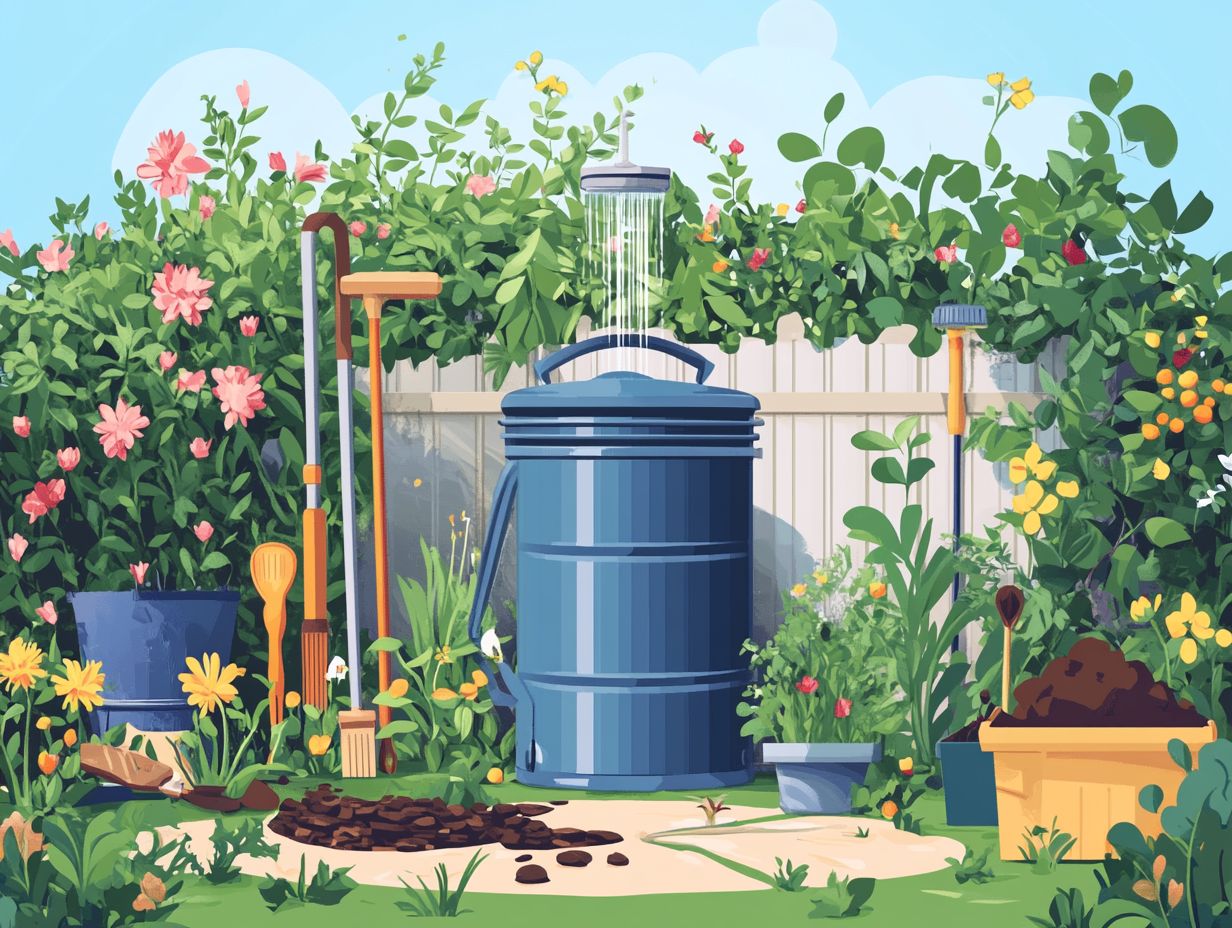
To ensure the safety and effectiveness of your greywater applications, it s vital to adhere to precautions and best practices think plant-friendly soaps and biodegradable products that support sustainable gardening.
You ll want to grasp the right methods for cleaning and treating greywater. Various contaminants can significantly impact soil and plant health.
Embracing safe irrigation techniques, like drip irrigation systems, will help you minimize exposure while maximizing efficiency. This promotes better nutrient absorption without overwhelming your plants.
Be sure to steer clear of soaps that contain phosphates or harsh chemicals. These can be harmful to your garden’s vitality and the surrounding ecosystem.
By opting for natural cleaning agents, you safeguard your plants and champion a sustainable approach to water management. This creates a healthier environment for both flora and fauna.
Maintaining and Troubleshooting Greywater Systems
Maintaining greywater systems is essential for ensuring their longevity and effectiveness. It involves regular inspections.
Understanding common issues that may arise will help you troubleshoot effectively.
By being proactive in your approach, you can maximize the efficiency of your system and address potential problems before they escalate.
Common Issues and How to Address Them
Common issues in greywater systems can range from blockages and unpleasant odors to ineffective watering methods. These challenges can be effectively resolved with the right troubleshooting techniques, including water treatment and nutrient recycling.
These problems often stem from debris accumulation or the use of unsuitable soaps and detergents.
To combat blockages, make regular maintenance part of your gardening routine. Cleaning filters and inspecting pipes should be a part of your schedule.
To tackle unpleasant odors, ensure proper ventilation. Incorporate biological treatments, such as plant-friendly soaps, to help break down organic matter.
Use effective watering strategies to maximize greywater use. Drip irrigation techniques and soaker hoses can optimize your system s performance and foster healthier plant growth through water reuse.
Implementing these solutions will boost your greywater system s reliability and performance!
Frequently Asked Questions
What is greywater and how can it be utilized in gardens?
Greywater refers to gently used household water from sources like sinks, showers, and washing machines. It can be safely utilized in gardens to reduce water usage and promote plant growth through organic gardening techniques.
What are the benefits of utilizing greywater in gardens?
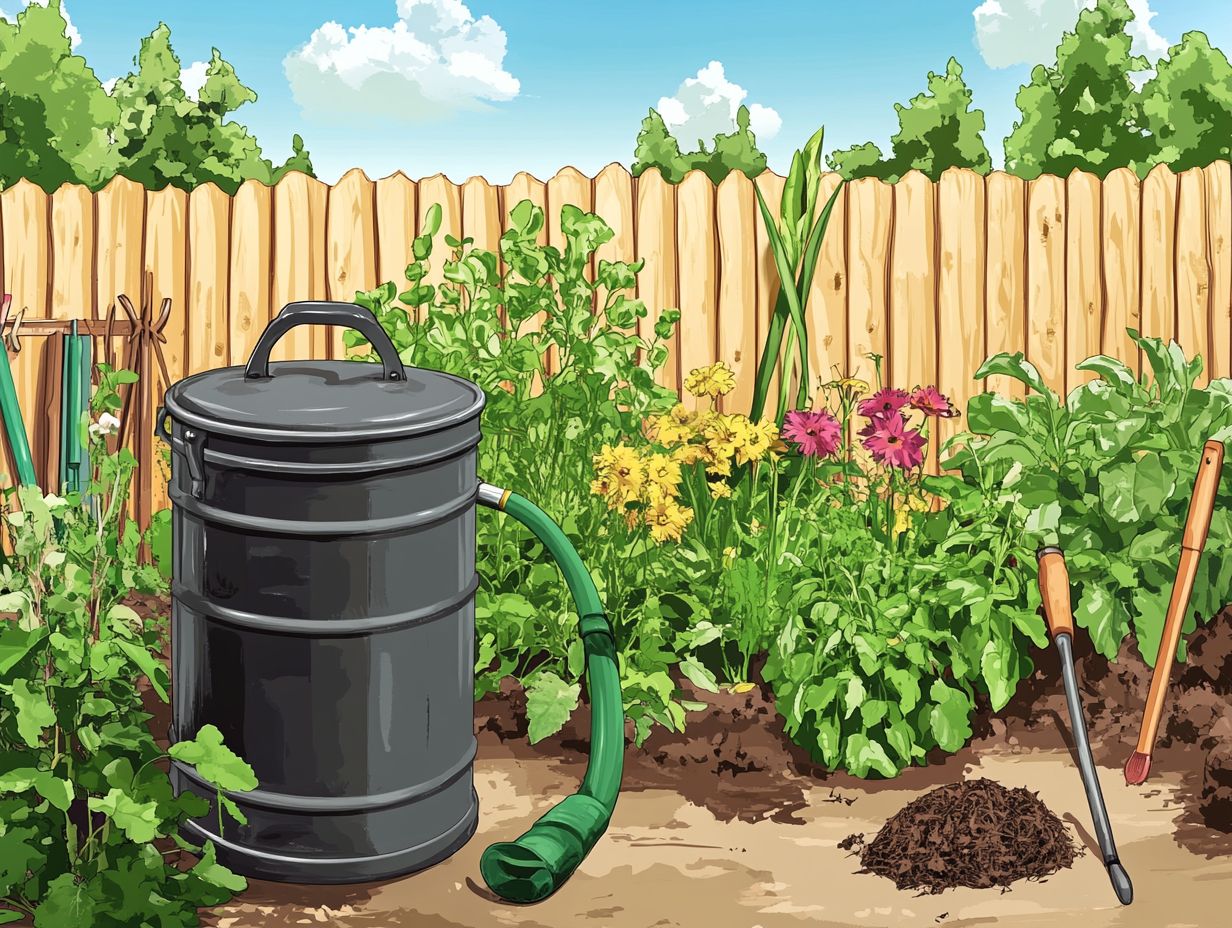
Utilizing greywater systems for garden use offers amazing benefits, including reducing water usage and expenses, promoting plant health, and decreasing the environmental impact of household water usage.
How can I collect and store greywater for use in my garden?
Greywater can be collected through various methods, such as using a bucket or basin to catch water from the sink or shower, or installing a greywater system that diverts water from your washing machine or shower directly into your garden.
Are there any precautions I should take when using greywater in my garden?
Yes, always check the source of your greywater. Avoid water that may have harmful chemicals or bacteria.
It is also recommended to use greywater within 24 hours to prevent the growth of harmful microorganisms.
Ready to start using greywater in your garden? Follow these tips to make a difference!
What types of plants can be watered with greywater?
Curious about using greywater in your garden? Most plants can benefit from it, but avoid using greywater on plants that people eat raw.
Use greywater carefully to avoid overwatering. It may contain higher levels of nutrients than regular water.
How can I ensure that my greywater is safe for use in my garden?
To keep greywater safe, use natural cleaning products and avoid harsh chemicals.
Regularly maintain and clean your greywater collection system for the best results.

